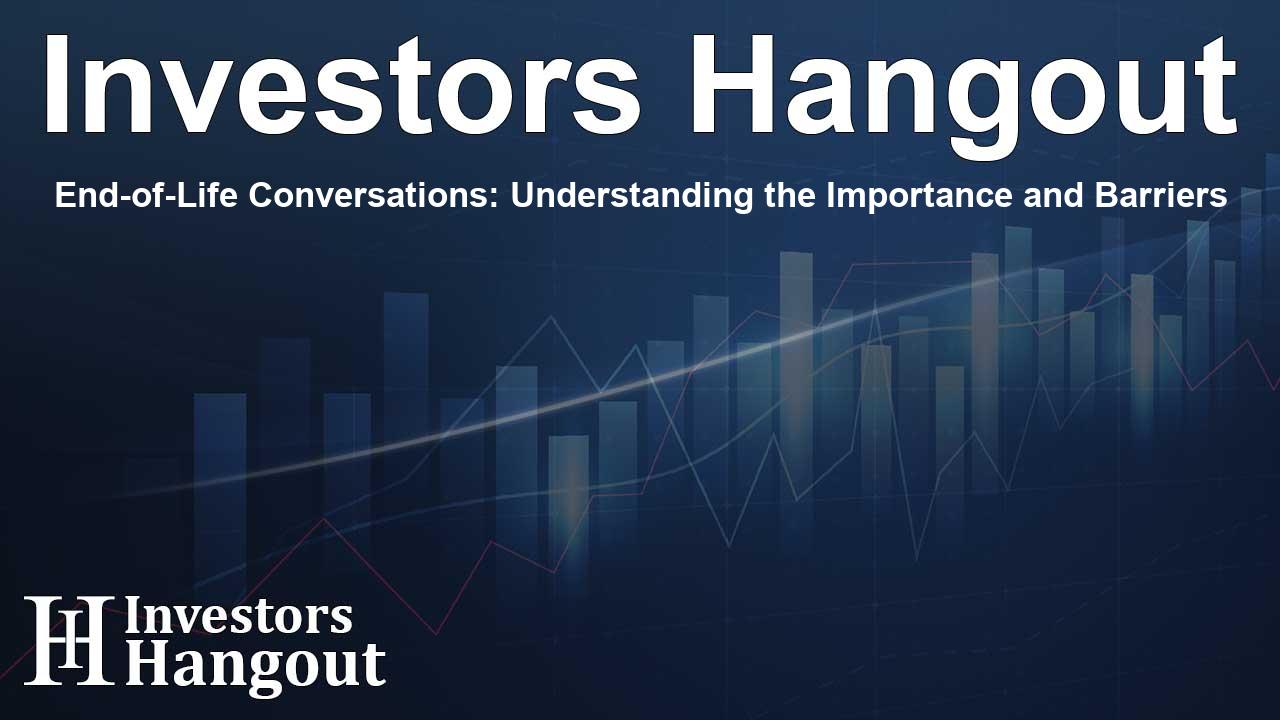End-of-Life Conversations: Understanding the Importance and Barriers

Understanding the Importance of End-of-Life Conversations
Afterall, a digital platform for end-of-life planning, provides essential guidance for individuals navigating difficult conversations about final wishes. Recent research unveils a gap between understanding and initiating these essential discussions. An impressive 90% of survey participants acknowledged that discussing end-of-life plans is important, yet surprisingly, over half of them have not yet begun these crucial talks.
Breaking Down the Barriers
The findings underscore notable barriers individuals face in discussing these sensitive topics. The challenges stem from various emotional hurdles. Many individuals feel overwhelmed when faced with the task of discussing their final plans, creating a daunting prospect for families. Afterall aims to remove these obstacles by supporting individuals throughout their journeys, making it easier to foster these discussions.
Why Are Conversations So Hard?
Having conversations about death and finality is inherently difficult. The Afterall survey, which involved 2,000 American adults, explored these complexities. Less than 40% of respondents felt comfortable discussing end-of-life plans directly with their parents, while a staggering 56% admitted they hadn't even broached the topic.
Common Reasons People Avoid the Discussion
Many respondents cited uncertainty as a key reason for their hesitance. About 26% mentioned they simply kept postponing the conversation, while 23% felt clueless on how to begin discussing inevitable realities. Additionally, 16% admitted fear obstructs them from approaching their loved ones. This hesitation only complicates the process for individuals seeking clarity on their family's final wishes.
The Importance of In-Person Conversations
Research indicates that over 50% of individuals prefer having these discussions face-to-face, indicating a desire for personal connection during such challenging topics. Unfortunately, with technological advancements, many families find themselves physically distant, making it all the more challenging to initiate these dialogues.
Support from Experts
To ease these difficult conversations, Afterall collaborates with experts like Julie McFadden, RN, a New York Times bestselling author and celebrated hospice care nurse. Julie's insights from years of experience with families during critical moments showcase the importance of starting these discussions sooner rather than later. Her advice encourages families to embrace the discomfort associated with end-of-life conversations.
Encouraging Open Dialogue
According to Julie, every effort counts. She highlights that initiating such discussions, regardless of how 'perfect' the approach is, tells loved ones that one is open to talking about these crucial matters. Afterall extends vital resources to equip individuals with tools and information, enabling them to engage confidently in these sometimes challenging dialogues.
Survey Methodology
The insights from this study were crafted through collaboration with Talker Research, focusing on understanding how Americans approach end-of-life discussions. This survey reflects a growing awareness of the importance of these conversations and the need for accessible resources.
About Afterall
Afterall is a comprehensive digital platform committed to making end-of-life planning accessible and straightforward. Partnered with over 250 local funeral service providers, Afterall aims to provide educational resources, planning tools, and compassionate support for families navigating this journey. It effectively consolidates options into one user-friendly site, making the overall experience less overwhelming for families in need.
Frequently Asked Questions
What is Afterall?
Afterall is a digital platform dedicated to simplifying end-of-life planning with educational tools and resources for families.
Why are end-of-life conversations important?
These conversations help ensure that loved ones are informed about each other's wishes and make the planning process easier and more understanding.
What are common barriers to discussing end-of-life topics?
Common barriers include emotional discomfort, uncertainty on how to approach the topic, and fear of the implications of such discussions.
How can families initiate these hard conversations?
Starting with openness and honesty can help ease discomfort; utilizing available resources can also facilitate the dialogue.
Where can I find more information about Afterall?
For additional resources, visit Afterall's website, where you can find guidance on starting end-of-life conversations.
About Investors Hangout
Investors Hangout is a leading online stock forum for financial discussion and learning, offering a wide range of free tools and resources. It draws in traders of all levels, who exchange market knowledge, investigate trading tactics, and keep an eye on industry developments in real time. Featuring financial articles, stock message boards, quotes, charts, company profiles, and live news updates. Through cooperative learning and a wealth of informational resources, it helps users from novices creating their first portfolios to experts honing their techniques. Join Investors Hangout today: https://investorshangout.com/
Disclaimer: The content of this article is solely for general informational purposes only; it does not represent legal, financial, or investment advice. Investors Hangout does not offer financial advice; the author is not a licensed financial advisor. Consult a qualified advisor before making any financial or investment decisions based on this article. The author's interpretation of publicly available data shapes the opinions presented here; as a result, they should not be taken as advice to purchase, sell, or hold any securities mentioned or any other investments. The author does not guarantee the accuracy, completeness, or timeliness of any material, providing it "as is." Information and market conditions may change; past performance is not indicative of future outcomes. If any of the material offered here is inaccurate, please contact us for corrections.